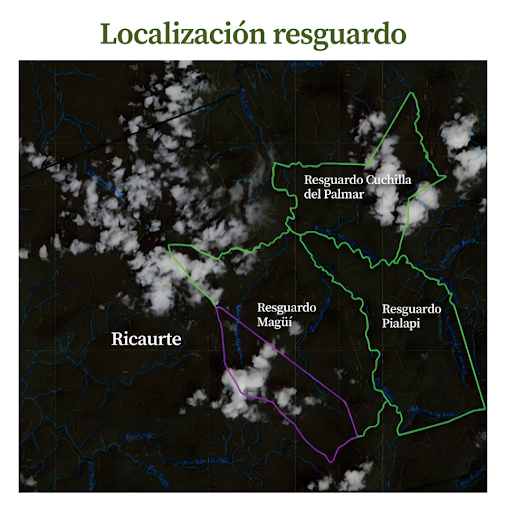Weavers of Life: The Land That Feels and Listens
Weavers of Life (Tejedores de Vida) is a new, bilingual series of articles that collect the stories of people and groups who defend beings other than humans. The series is a collaboration between Weave News, Talking Rivers, and author Johana Fernanda Sánchez Jaramillo.
Read the Spanish-language version here.
Source: Johana Fernanda Sánchez Jaramillo, Los derechos de la naturaleza y su repercusión en la defensa de Katsa SU del pueblo Awá en Nariño (Colombia) (Editorial El Rosario, 2024).
Four years ago I went for the first time to Katsa Su, which in Awápit means “House” for the Awá, a place where all living beings are people. With the generous help of the Magüí Reservation, I was introduced to a world where family also includes trees, rivers, mountains, and waterfalls.
The Inkal Awá people, people of the jungle or de mountains, is located in the southwest part of Nariño department (Colombia) and the northwest of Ecuador on approximately 610,000 hectares, the majority in Colombia.
They existed as one before the countries we know as Colombia and Ecuador were constituted. They lived in a single territory in Nariño and Putumayo provinces, a small strip in Cauca province in Colombia, and in the Imbabura, Carchi, and Esmeraldas provinces in Ecuador.
Living beautifully in the four worlds: the harmony that guides the Awá
Source: Unidad Indígena del Pueblo Awá (UNIPA), Agenda Awá 2023.
In the cosmovision of the Awá, there are four worlds. The first is the world of the small beings, like armadillos and ants. The second is where the Awá live. In the third world they are accompanied by the spirits. Finally, in the fourth, is the creator of everything. In this context, the Awá strive to live beautifully, Wat Uzán, just like their ancestors, and keep the equilibrium that they inherited from their elders. However, this represents a huge challenge in Colombia, a country where the Awá are under fire due to a seemingly endless armed conflict in which illegal actors dispute their territory. It is not easy to maintain the social patchwork in the face of illegal armed forces that use the Magüí Reservation as a corridor to transport processed cocaine without their consent and through the gut of Katsa Su.
Despite the difficulty and dangers, women and men have joined the guardia indigena ambiental (the indigenous environmental guard), a group that travels throughout the Casa Grande (Large House) to protect the territory from the violence that has sickened it. With love, devotion, and dedication, these people have voluntarily assumed this position. They are responsible for walking between the six communities that form the reservation, and talking to community members about the consequences of cultivating illegal crops, contamination, deforestation, and interacting with the armed forces. They also teach children as young as five years old how to respect Katsa Su and join the indigenous environmental guard when they become adults.
The language of the jungle: beings that listen to each other
Source: Johana Fernanda Sánchez Jaramillo, Los derechos de la naturaleza y su repercusión en la defensa de Katsa SU del pueblo Awá en Nariño (Colombia) (Editorial El Rosario, 2024).
From a very young age, the girls and boys learn from their seniors about the commitment tattooed in their souls to take care of the place where the Awá have created life from the beginning of time, eventually these kids will follow their footprints.
This protection is possible thanks to the fact that they speak the language of the jungle, the language of the mountain. They understand it more than anyone else, just like they understand the beings with whom they share this space and time. They listen attentively and let themselves be guided. In Katsa Su, every form of life has an important role in sustaining life.
These beings orient them. Some birds tell time, while others counsel them to go outside or to remain indoors. In a subtle, yet perceptibly clear way, Katsa Su/Large House/Mother Earth takes care of the Awá and loves them like a mother. She also lets them know when she is sad, sick or happy. The tree bleeds when they are hurt, and the rivers demand respect, requiring humans to ask for permission to know their mysteries. Mountains close themselves before visitors with bad intentions, clouding over and making the visitor lose direction.
The Awá are, for me, a living fountain of wisdom: they teach me that it is possible to live in the world in peace with all existence. From them, I learn how to listen to the language of the mountain, to cultivate a robust love for Mother Earth, to weave an intimate relationship with her, and to extend my kinship to all beings.



